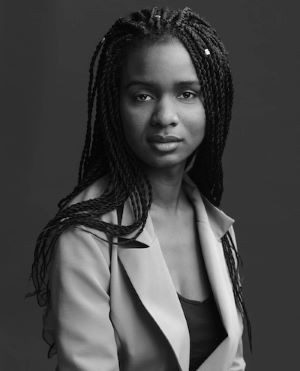Meet The Playwrights: Gethsemane Herron-Coward ‘19
BLANKS by Gethsemane Herron-Coward ’19 and directed by Tyler Thomas is the sixth play to be presented as part of the New Plays Festival 2019 featuring seven new plays by the graduating MFA playwriting class.
BLANKS is about Reese, a Black girl who is desperately hunting for the love of her dreams. Meanwhile, women who’ve been harmed by love—Ruth Younger, Bessie Mears, and Margaret Garner—try to save Reese from love’s harm. It is a play that begs the question if love conquers all, what happens when it conquers you?
BLANKS has three performances scheduled; the first on May 15 at 2:30 pm, the second on May 17 at 8 pm, and the final on May 18 at 2:30 pm. All performances take place at the Ford Foundation Studio Theatre at the Pershing Square Signature Center. For more information and to make reservations click here.
Who was your mentor for this piece and how has it been getting to work with him/her?
My mentor was Marcus Gardley and he was wonderful! Between writing for the stage and screen and teaching, Marcus very graciously offered me his time and expertise. After seeing The House That Will Not Stand, I knew he was a genius. I’m so honored to have been under his tutelage.
How did you get the idea for this play?
I got the germ of an idea in 2017 when I started writing about this character named Reese, a black woman contemplating abortion. Then, a New York Times article came out about the black maternal mortality rate—how dangerous it was for black women to give birth. I already knew that Black women had an astoundingly high IPV rate for women and it broke my heart. I look at everything through a lens of literature and I thought of black women I'd read of who were harmed while pursuing love. Then, I started writing.
How did you become a playwright?
I started writing nonsense plays as a toddler. My mother bought me a toy puppet theatre and I had a red puppet, a yellow puppet, and a green puppet. I would put on nonsense plays for my mother, who always took them seriously—she was my first dramaturg, always asking me what was motivating which puppet. When I was eight, she took me to see the Lion King on Broadway—and that was it. Theatre was all I wanted to do.
What is your process for starting a new play?
I’m still a new writer, so the process is always changing. For this play, I started looking at plays that were in conversation with previous plays, or adaptations or sequels. Think An Octoroon and The Octoroon, Harvey by Mary Chase and Brother Rabbit by Jonathan Payne. I also reread source texts—A Raisin in the Sun, Native Son. I read so much about love from the words of scholars, peers, and contemporaries—the work of Hiwot Adilow was helpful, as well as Bell Hooks. After researching for months, I wrote the piece in twenty-page intervals and then developed it with the Millay Colony, JAGProductions, The Hearth, and a few other opportunities. I had an immense amount of support and I’m so grateful for the dozens who helped me. I hope to do this again for my next play.
What do you hope the audience gets out of seeing BLANKS?
I hope they see the ways violence is pernicious and subtle and I hope they fight its presence—in language, in who is designated as human—every day. I hope they cherish their friends who are some of the world’s greatest gifts.
How has the playwriting program prepared for you for the creation of this piece?
Everyone should study with Charles Mee! His class was so transformative to my writing, to my creativity and I go back to the prompts of that class. Lynn Nottage, Marcus Gardley, and David Henry Hwang have been so kind and generous, in addition to Blair Singer, Anne Bogart, and Anya Epstein. Their lessons will always remain with me.
How is the collaboration process with your director and creative team?
It’s been lovely! I think Tyler is a director to watch. She's whip-smart, patient, kind and very strong and innovative. From her, I met Rashidah and Jocelyn and they are truly incredible. Dennis is a superstar and I am not worthy. Ebony is phenomenal—I could go on and on.
Who are some playwrights that you admire and why?
Kia Corthron is a genius. Paula Vogel. Maria Irene Fornes. Caryl Churchill. Adrienne Rich. All of my teachers and their teachers.
How has your background as a poet influenced your work as a playwright?
Poetry gives you the ability to expand and collapse time, and it gives you a dexterity of form, a relationship with words and their strangeness, an irreverence for text, the ability to fuck up some language. It’s foundational to my work and I feel lucky to be a part of the tradition that writers like Amiri Baraka or Edna St. Vincent Millay have laid out in front of me.
Now that your time in grad school is coming to an end what are you most looking forward to?
Pouring into myself. Time for yoga, time for sleeping, and time for recharging.

Gethsemane Herron-Coward is a poet-turned-playwright from Washington, D.C. She is a 2016 semi-finalist for the Rising Circle INK TANK, a 2016 finalist for the Jane Chambers Playwriting Award, a 2017 finalist for SPACE on Ryder Farm. Gethsemane is also a 2016 Grant Recipient from the Puffin Foundation, which supported her residency with JAW Magic Time at Judson Memorial Church. Gethsemane’s short play, The Falling Man received a production in The Fire This Time Festival in 2018. Her work has been supported by the Virginia Center for the Creative Arts and the Millay Colony, where she was the 2018 Yasmin Scholarship Fellow. Her work has been seen in Atlanta Black Star, The Washington Post, the 24 Hour Plays: Nationals and Columbia University.